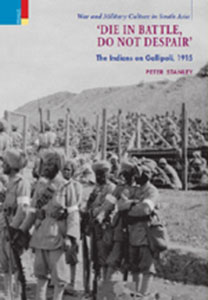
INFORMATION
- AUTHOR : Peter Stanley
- HB ISBN : 978-93-86552-38-9
- Year : 2017
- Extent : 384 pp.
- Discount available on checkout
- Usually dispatched within 3 to 5 working days.
‘Die in Battle, Do Not Despair’
‘The Indians on Gallipoli, 1915’
| HB ₹ 1,295 . $ . ₤ |
||
INFORMATION
- AUTHOR – Peter Stanley
- ISBN – 978-93-86552-38-9
- Year – 2018 Royal 8vo, 384pp, HB
- Extent: 400 + 40 coloured illustrations
- 10% discount + free shipping
- Usually dispatched within 3 to 5 working days.
About 1,600 of the Indians who served on Gallipoli died, in action at Gurkha Bluff and Hill 60. They took part in terrible, failed attacks, at Gully Ravine and Gully Spur andin the climactic attempt in August to seize the summit of Sari Bair-one of the Gurkhas’ most cherished battle honours. Though commemorated on the great memorial to the missing at Cape Helles (because most Indians’ bodies were crematedor, actually, lost) they are practically invisible on Gallipoli today. The Indian story of Gallipoli has barely been told before. Not only is this the first book about their part in the campaign to be published in the century since 1915, but it also tells their story in new and unexpected ways. Though inescapably drawing on records created by the force’s British officers ,it strives to recapture the experience of the formerly anonymous sepoys, gunners and drivers, introducing Indians of note-Mit Singh, Gambirsing Pun, Kulbahadur Gurung, and Jan Mohamed-alongside the more familiar British figures.
Peter Stanley teaches at University of New South Wales, Canberra.
About 1,600 of the Indians who served on Gallipoli died, in action at Gurkha Bluff and Hill 60. They took part in terrible, failed attacks, at Gully Ravine and Gully Spur andin the climactic attempt in August to seize the summit of Sari Bair-one of the Gurkhas’ most cherished battle honours. Though commemorated on the great memorial to the missing at Cape Helles (because most Indians’ bodies were crematedor, actually, lost) they are practically invisible on Gallipoli today. The Indian story of Gallipoli has barely been told before. Not only is this the first book about their part in the campaign to be published in the century since 1915, but it also tells their story in new and unexpected ways. Though inescapably drawing on records created by the force’s British officers ,it strives to recapture the experience of the formerly anonymous sepoys, gunners and drivers, introducing Indians of note-Mit Singh, Gambirsing Pun, Kulbahadur Gurung, and Jan Mohamed-alongside the more familiar British figures.
Peter Stanley teaches at University of New South Wales, Canberra.




